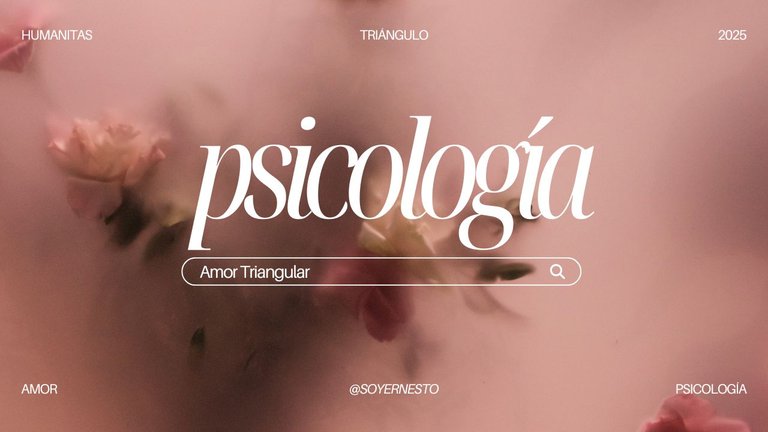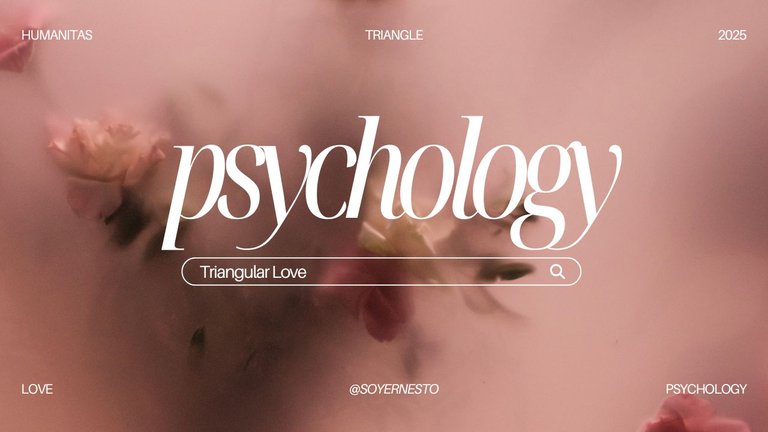El amor siempre se ha considerado un tema complejo. El amor siempre ha fascinado a filósofos, poetas y científicos, buscando la mejor arista para su análisis a lo largo de la historia. Desde el campo de la psicología, el amor se analiza en toda su complejidad, abarcando comportamientos, emociones y pensamientos intrincados o adquiridos. Y aunque muchos lo describen como una emoción intensa, la psicología va mucho más allá, es ese proceso dinámico que combina biología, sociedad y necesidades individuales físicas y emocionales.

Triangular el Amor: Una de las teorías más afianzadas desde la psicología es la posibilidad de triangular el amor en tres aspectos o elementos y la relación entre estos:
Intimidad: Basada en conexiones de nivel emocional y físico, que crecen desde la confianza.
Pasión: La pasión comienza con la atracción y llega hasta el deseo físico.
Compromiso: Una decisión consciente de mantenerse unido tanto física como emocionalmente a alguien.
Algo muy curioso es que la psicología, a pesar de referirse a este triángulo, acepta que no en todas las relaciones se necesitan estar los tres componentes presentes a la vez. De ahí podemos diferenciar los distintos tipos de amor, por ejemplo: el amor romántico tiene una mayor presencia de los aspectos intimidad y pasión, sin embargo, el amor filial está más relacionado a los aspectos intimidad y compromiso.
Aunque los estudios más enfocados a nivel médico y biológico hablan de la oxitocina (la hormona del apego) como el principal causante de la creación de vínculos, la psicología insiste en que el amor no puede ser sólo química; es esa combinación con las experiencias de cada persona, ejemplo: amores de infancia, pueden moldear nuestra manera de relacionarnos de adultos.
Entonces, ¿por qué repetimos patrones? ¿Por qué muchos buscan una y otra vez una relación tóxica y otros huyen aterrados del compromiso? Para responder a estas preguntas regresamos a la teoría del apego, desarrollada por John Bowlby, repitiendo que nuestra infancia define nuestro estilo de amar en la adultez, y esta vez vuelve a ser tres el número de estilos de amor principales:
Apego seguro: Personas que se sienten muy cómodas tanto en la intimidad como en las relaciones estables, creen en el verdadero amor, la estabilidad y el compromiso.
Apego ansioso: Personas que necesitan constante validación y atención, temen ser abandonadas o ser defraudadas por la persona a la que dan su amor.
Apego evitativo: Personas extremadamente independientes que necesitan mantener siempre su espacio personal y hasta cierta distancia entre ellos y la persona que aman. Sus prioridades son la independencia y suelen cerrarse emocionalmente ante los demás.
De ahí vemos comportamientos comunes y fáciles de identificar, por ejemplo: una persona con apego ansioso puede presentar comportamientos considerados tóxicos como enviar constantemente mensajes a su pareja para “asegurarse” de que no serán engañados o abandonados, mientras que pasaría todo lo contrario con una persona evitativa, quien apenas mandaría mensajes a su pareja, pero esto no significaría una falta o un nivel menor de amor.
Es aquí donde la psicología hace su papel de mediador más importante porque estos aspectos o aristas no son un molde rígido o una condena. La psicología puede identificar los patrones más nocivos tanto para nosotros como para nuestra pareja y a través de la terapia y el desarrollo de habilidades de autoconocimiento, desarrollar un cuarto apego: el apego consciente, un apego que se basa en tomar lo mejor de cada aspecto y fomentar relaciones profundas y sólidas.
Sea cual sea el origen del amor, lo importante es que es un viaje constante de autodescubrimiento, que necesita ser construido desde la conciencia. Entender el enfoque, ya sea químico, biológico o psicológico, no tiene por qué quitarle romanticismo. Como diría Erich Fromm: “El amor no es algo que se encuentra, es algo que se cultiva”.
aquíPuedes ver el post original de @eudemo
Jueves 6 de febrero: El amor desde la psicología: teorías del apego y su impacto en nuestras relaciones.
Quiero agradecerles sinceramente por tomarse el tiempo de leer este artículo. Su apoyo significa mucho para mí y me motiva a seguir compartiendo contenido que pueda ser útil e interesante para ustedes. Si encontraron este artículo útil o disfrutaron leyéndolo, les agradecería enormemente sus comentarios. Éxitos.

Love has always been considered a complex subject. Love has always fascinated philosophers, poets and scientists, searching for the best edge for its analysis throughout history. From the field of psychology, love is analyzed in all its complexity, encompassing intricate or acquired behaviors, emotions and thoughts. And although many describe it as an intense emotion, psychology goes much further, it is that dynamic process that combines biology, society and individual physical and emotional needs.

Triangulate Love: One of the most entrenched theories from psychology is the possibility of triangulating love into three aspects or elements and the relationship between them:
- Intimacy: Based on emotional and physical level connections, which grow from trust.
- Passion: Passion begins with attraction and goes all the way to physical desire.
- Commitment: A conscious decision to stay attached both physically and emotionally to someone.
Something very curious is that psychology, despite referring to this triangle, accepts that not all relationships need to have all three components present at the same time. From there we can differentiate the different types of love, for example: romantic love has a greater presence of the aspects intimacy and passion, however, filial love is more related to the aspects intimacy and commitment.
Although the most medically and biologically focused studies speak of oxytocin (the attachment hormone) as the main cause of bonding, psychology insists that love cannot be only chemistry; it is that combination with the experiences of each person, e.g. childhood loves, can shape the way we relate to each other as adults.
So why do we repeat patterns, why do many people seek out a toxic relationship over and over again and others flee in fear of commitment? To answer these questions we return to attachment theory, developed by John Bowlby, repeating that our childhood defines our style of loving in adulthood, and this time there are again three main love styles:
- Secure attachment: People who are very comfortable in both intimate and stable relationships, believe in true love, stability and commitment.
- Anxious attachment: People who need constant validation and attention, fear being abandoned or being let down by the person to whom they give their love.
- Avoidant attachment: Extremely independent people who always need to maintain their personal space and even some distance between them and the person they love. Their priorities are independence and they tend to close themselves emotionally to others.
From there we see common and easy to identify behaviors, for example: a person with anxious attachment may present behaviors considered toxic such as constantly sending messages to their partner to “make sure” that they will not be cheated on or abandoned, while the opposite would happen with an avoidant person, who would barely send messages to their partner, but this would not mean a lack or a lower level of love.
This is where psychology plays its most important mediating role because these aspects or edges are not a rigid mold or condemnation. Psychology can identify the most harmful patterns for both ourselves and our partner and through therapy and the development of self-awareness skills, develop a fourth attachment: conscious attachment, an attachment that is based on taking the best of each aspect and fostering deep and solid relationships.
Whatever the origin of love, the important thing is that it is a constant journey of self-discovery, which needs to be built from awareness. Understanding the approach, whether chemical, biological or psychological, need not detract from its romanticism. As Erich Fromm would say, “Love is not something you find, it is something you cultivate.”
aquíPuedes ver el post original de @eudemo
Jueves 6 de febrero: El amor desde la psicología: teorías del apego y su impacto en nuestras relaciones.
I sincerely want to thank you for taking the time to read this article. Your support means a lot to me and motivates me to continue sharing content that can be useful and interesting for you. If you found this article helpful or enjoyed reading it, I would greatly appreciate your feedback. Best wishes.

Translated with DeepL.com (free version)
I apologize if there are any grammatical errors, English is not my native language, I have tried to be as careful as possible.
I regularly create images on Pixabay, which are free of copyright. Access my gallery by clicking here.
All assets, illustrations and banners have been created by me and are original content, unless otherwise specified.
The cover of this article was created using Canva.
Posted Using INLEO
Leyendo esta publicación pude notar que soy del tipo de persona que tiene apego evitativo. Puedo enamorarme, pero me siendo agobiado si paso mucho tiempo con una persona o si hablamos mucho rato seguido. Siento que pierdo algo de mi libertad y que podría acabar dependiendo de esa persona, por eso suelo evitar crear vínculos afectivos muy fuertes. Prefiero mantener algo de distancia.
PD: Mencionas un cuarto tipo de apego, pero el nombre que mencionas es "Apego seguro" y ese fue el primero de los tres que mencionaste inicialmente. Quizás hay un error allí.
Gracias por tu post, un saludo.
Muchas gracias, definitivamente cometí un error. La cuarta arista sería el apego consciente. Perdón por el error, es que a veces me apresuro al escribir. En cuanto a que te identificas como una persona con apego evitativo, puede que simplemente respetes tu espacio, lo cual no es algo negativo. Lo más importante es llegar a consensos saludables a través del diálogo y la comprensión con las personas que nos rodean. Trataré de corregirlo en el cuerpo del texto o dejar una fe de erratas para los lectores. ¡Te reitero mi agradecimiento! Mucha suerte y que tengas un lindo día. 🍀
Pues, sí respeto mi espacio, pero definitivamente es apego evitativo jaja. Debería hablarlo con mi terapeuta en la próxima sesión.
Y de nada, estamos para ayudarnos 😊
Muchas gracias por explicar estos tipos de apego, las personas se van conociendo detrás de cada uno